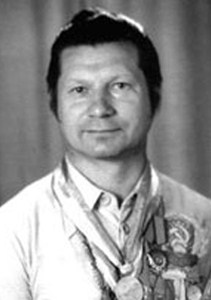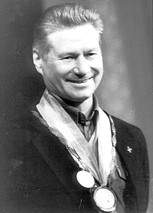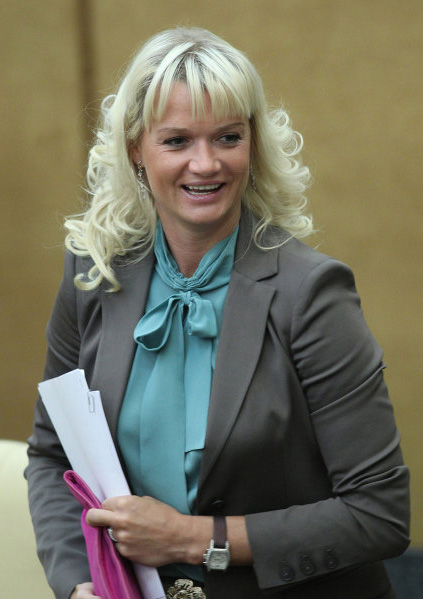Бушуев, Виктор Георгиевич. Бушуев виктор георгиевич
Бушуев Виктор Георгиевич | Централизованная библиотечная система Автозаводского района г. Нижнего Новгорода

Олимпийский чемпион по тяжелой атлетике (штанга)
Виктор Бушуев родился в 1933 году в г. Балахне Горьковской области. Детство прошло в поселке Чистое Балахнинского торфопредприятия. Окончил ремесленное училище энергетиков № 11 города Балахны. Работал на ремонтно-механическом заводе, на строительстве Горьковской ГЭС. Во время службы в армии увлекся тяжелой атлетикой.
Спортивную карьеру начинал в поселке Заволжье, в 1958 году переехал на постоянное место жительства в Горький. Выступал за общество «Труд». Входил в сборную СССР с 1955 по 1960 год. Установил три мировых рекорда в троеборье — 385 кг в 1957 г., 390 — в 1958 г. и 397,5 кг — в 1960 г. Установил шесть рекордов СССР.
На Олимпийских играх в Риме в 1960 году Виктор Бушуев, к тому времени уже трехкратный чемпион мира и двукратный чемпион Европы, стал сильнейшим — в сумме троеборья. Его основные соперники уступили ему 17,5 кг. Это был безоговорочный успех горьковского спортсмена, завоевавшего первую золотую олимпийскую медаль для своей области.
Закончив выступать на помосте, Виктор Георгиевич перешел на тренерскую работу. В 1961 году окончил Высшую школу тренеров. Работал со сборными командами Финляндии, Камбоджи, Сирии, был старшим тренером молодёжной сборной СССР. Секция тяжелой атлетики спортклуба «Торпедо» (Автозаводский район), где он трудился с 1970 по 1990 год, по праву считалась лучшей в области.
Ссылки:
Статьи:
- Татаринцев В. Чистый человек из деревни Чистое :[о Викторе Бушуеве] / В. Татаринцев // Ниж. спорт. – 2003. – 4 – 10 июня (№22). – С. 4.
- Рылов А. Ни о ком не отзывался плохо :[посвящается памяти Виктора Бушуева] / А. Рылов // Ниж. спорт. – 2003. – 30 апр. – 6 мая (№17). – С.1. — (Уходят чемпионы).
- Бирюзов В. Фантастический легковес : [о В. Бушуеве, олимпийском чемпионе по тяжелой атлетике] // Автозаводец. – 2001. – 4 янв. – С. 3. – фот. (скачать, 58 Кб)
lib-avt.ru
Бушуев Виктор Георгиевич - Волжский перекрёсток
≡ : без подписи Опубликовано: 07 декабря 2007 Просмотров: 14201
Бушуев Виктор Георгиевич родился в г. Балахне, в 1949 году окончил ремесленное училище № 11 и был направлен на строительство Горьковской ГЭС.
В 1950 году начал заниматься тяжёлой атлетикой и в 1956 году выполнил норматив мастера спорта СССР. В том же году на Спартакиаде народов РСФСР занял третье призовое место. а на Спартакиаде народов СССР – четвёртое. В апреле 1957 года Бушуев В.Г. включён в состав сборной команды СССР для участия в III дружеских спортивных играх молодёжи, где занял первое место и установил первый свой мировой рекорд. В ноябре 1957 года в Тегеране на чемпионате мира он занял первое место. В октябре 1958 году в Стокгольме и сентябре 1959 года в Варшаве Бушуев В.Г. в составе сборной команды СССР принимал участие в чемпионатах мира и Европы и стал чемпионом СССР, завоевал право участвовать в XVII Олимпийских играх в Риме, где стал чемпионом. С 1956 по 1963 годы Бушуев стал призёром трёх Спартакиад народов РСФСР и СССР. В составе сборной команды СССР и РСФСР участвовал в матчевых встречах в США, Китае, Болгарии, на Кубе и в других странах. За годы вступления в составе сборной команды СССР установил пять всесоюзных, три мировых и два олимпийских рекорда.
Закончив выступления за сборную команду страны Бушуев В.Г. работал старшим тренером областного Совета ДСО «Труд», старшим тренером спортклуба «Торпедо» с 1980 по 1990 год был председателем федерации тяжёлой атлетики области. С 1968 по 1970 год работал с национальной сборной командой Камбоджи, с 1976 по 1978 год со сборной Сирийской арабской республики
За большие достижения в спорте Бушуев В.Г. награждён орденом Трудового Красного Знамени, многими дипломами, знаками и грамотами. Ему присвоено звание «Заслуженный мастер спорта».
Постановлением городской Думы г. Заволжья от 28 июля 2000 года Бушуеву Виктору Георгиевичу присвоено звание «Почётный гражданин города Заволжья».
radilov.ru
Нижегородский некрополь - Бушуев В.Г.




Бушуев Виктор Георгиевич
(18 мая 1933 – 24 апреля 2003)
заслуженный мастер спорта СССР (тяжёлая атлетика), олимпийский чемпион, Почётный гражданин Заволжье Нижегородской области
Родился в городе Балахна Нижегородской области. Детство прошло в посёлке Чистое Балахнинского торфопредприятия. Окончил ремесленное училище энергетиков № 11 города Балахны. Работал на ремонтно-механическом заводе, на строительстве Горьковской ГЭС. Во время службы в армии увлёкся тяжёлой атлетикой.
Выступал за общество «Труд». С 1955 по 1960 годы входил в сборную СССР. На олимпийских играх в Риме (1960) завоевал для Нижегородской области первую и пока единственную золотую медаль в тяжелой атлетике. Чемпион мира (1957, 1958, 1959), чемпион Европы (1958, 1959), двух-кратный чемпион СССР, трёх-кратный чемпион РСФСР.
Автор трёх мировых рекордов в лёгком весе в троеборье: 385 кг (1957), 390 кг (1958) и 397,5 кг (1960)
Закончив выступать на помосте, Виктор Георгиевич перешел на тренерскую работу. В 1961 году окончил школу тренеров при ГОЛИФК имени Сталина. Работал со сборными командами Финляндии, Камбоджи, Сирии, был старшим тренером молодёжной сборной СССР. Секция тяжелой атлетики спортклуба «Торпедо», где он трудился с 1970 по 1990 год, по праву считалась лучшей в области. Виктор Бушуев отличался филигранной техникой. По его кинограммам (покадровая распечатка фотопленки, запечатлевшей движение спортсмена во время выполнения упражнения) училось не одно поколение штангистов. Среди его воспитанников – мастера спорта, победители молодежных первенств СССР, призеры других соревнований. В.Г. Бушуев был одним из организаторов Всесоюзных заочных соревнований по гиревому спорту. В течении десяти лет был старшим тренером области. Председатель Федерации области по тяжёлой атлетики.
Награды: ордена Трудового Красного Знамени и «Знак Почета», золотой знак международного Олимпийского комитета.
Почётный гражданин Заволжье Нижегородской области (28.07.2000).
Бугровское кладбище - 13 участок
niznov-nekropol.ucoz.ru
| СССР СССР | |||||||||||||||||||
| тяжёлая атлетика | |||||||||||||||||||
| спортивное общество «Труд» | |||||||||||||||||||
| 18 мая 1933(1933-05-18) | |||||||||||||||||||
| БалахнаГорьковская область,РСФСР, СССР | |||||||||||||||||||
| 24 апреля 2003(2003-04-24) (69 лет) | |||||||||||||||||||
| Нижний Новгород | |||||||||||||||||||
| до 67 кг | |||||||||||||||||||
Награды и медали
| |||||||||||||||||||
www.turkaramamotoru.com
Бушуев, Виктор Георгиевич - WikiVisually
1. Союз Советских Социалистических Республик – The Soviet Union, officially the Union of Soviet Socialist Republics was a socialist state in Eurasia that existed from 1922 to 1991. It was nominally a union of national republics, but its government. The Soviet Union had its roots in the October Revolution of 1917 and this established the Russian Socialist Federative Soviet Republic and started the Russian Civil War between the revolutionary Reds and the counter-revolutionary Whites. In 1922, the communists were victorious, forming the Soviet Union with the unification of the Russian, Transcaucasian, Ukrainian, following Lenins death in 1924, a collective leadership and a brief power struggle, Joseph Stalin came to power in the mid-1920s. Stalin suppressed all opposition to his rule, committed the state ideology to Marxism–Leninism. As a result, the country underwent a period of rapid industrialization and collectivization which laid the foundation for its victory in World War II and postwar dominance of Eastern Europe. Shortly before World War II, Stalin signed the Molotov–Ribbentrop Pact agreeing to non-aggression with Nazi Germany, in June 1941, the Germans invaded the Soviet Union, opening the largest and bloodiest theater of war in history. Soviet war casualties accounted for the highest proportion of the conflict in the effort of acquiring the upper hand over Axis forces at battles such as Stalingrad. Soviet forces eventually captured Berlin in 1945, the territory overtaken by the Red Army became satellite states of the Eastern Bloc. The Cold War emerged by 1947 as the Soviet bloc confronted the Western states that united in the North Atlantic Treaty Organization in 1949. Following Stalins death in 1953, a period of political and economic liberalization, known as de-Stalinization and Khrushchevs Thaw, the country developed rapidly, as millions of peasants were moved into industrialized cities. The USSR took a lead in the Space Race with Sputnik 1, the first ever satellite, and Vostok 1. In the 1970s, there was a brief détente of relations with the United States, the war drained economic resources and was matched by an escalation of American military aid to Mujahideen fighters. In the mid-1980s, the last Soviet leader, Mikhail Gorbachev, sought to reform and liberalize the economy through his policies of glasnost. The goal was to preserve the Communist Party while reversing the economic stagnation, the Cold War ended during his tenure, and in 1989 Soviet satellite countries in Eastern Europe overthrew their respective communist regimes. This led to the rise of strong nationalist and separatist movements inside the USSR as well, in August 1991, a coup détat was attempted by Communist Party hardliners. It failed, with Russian President Boris Yeltsin playing a role in facing down the coup. On 25 December 1991, Gorbachev resigned and the twelve constituent republics emerged from the dissolution of the Soviet Union as independent post-Soviet states
2. Тяжёлая атлетика – The two competition lifts in order are the snatch and the clean and jerk. Each weightlifter receives three attempts in each, and the total of the highest two successful lifts determines the overall result within a bodyweight category. Bodyweight categories are different for male and female competitors, a lifter who fails to complete at least one successful snatch and one successful clean and jerk also fails to total, and therefore receives an incomplete entry for the competition. The clean and press was once a competition lift, but was discontinued due to difficulties in judging proper form, properly executed, the snatch and the clean and jerk are both dynamic and explosive while appearing graceful, especially when viewed from a recording at a slowed speed. The sport is controlled by the International Weightlifting Federation, based in Budapest, it was founded in 1905. Athletes compete in a division determined by their body mass, there have been eight male divisions and eight female divisions since 2017. Prizes are usually given for the heaviest weights lifted in each, the order of the competition is up to the lifters—the competitor who chooses to attempt the lowest weight goes first. The barbell is loaded incrementally and progresses to a heavier weight throughout the course of competition, weights are set in 1 kilogram increments. When a tie occurs, the athlete with the lower bodyweight is declared the winner, if two athletes lift the same total weight and have the same bodyweight, the winner is the athlete who lifted the total weight first. During competition, the event takes place first, followed by a short intermission. Two successes are required for any attempt to pass, usually, the judges and referees results are registered via a lighting system with a white light indicating a successful lift and a red light indicating a failed lift. This is done for the benefit of all in attendance be they athlete, coach, in addition, one or two technical officials may be present to advise during a ruling. At local competitions, a Best Lifter title is commonly awarded and it is awarded to both the best mens and womens lifters. Competition to establish who can lift the heaviest weight has been recorded throughout civilization, with the earliest known recordings including those found in Egypt, China, today, the modern sport of weightlifting traces its origins to the European competitions of the 19th century. The first male champion was crowned in 1891, the weightlifters were not categorized by weight at this time. The first Olympic Games of 1896 included weightlifting in the Field event of the predecessor to todays track, during the 1900 Olympic Games, there was no weightlifting event. Weightlifting resumed as an event, again in athletics, in 1904 but was omitted from the Games of 1908 and 1912 and these were the last Games until after the First World War. In these early Games, a distinction was drawn between lifting with one only and lifting with two hands
3. Балахна – It was founded in 1474 as Sol-na-Gorodtse. After the Khan of Kazan razed it to the ground in 1536, for the following three centuries, Balakhna prospered as a center of saltworks and grain trade. By the Time of Troubles, it was the twelfth largest city in Russia, adam Olearius visited and described the town in 1636. That year several shipwrights from Holstein built the first Russian ships here, the people of Balakhna were also reputed for their skills in knitting and making colored tiles, which were used for decoration of the Savior Church and other local temples. Balakhna is one of the few Russian cities shown on the 1689 Amsterdam World Map, the northwestern part of Balakhna is known as Pravdinsk. It used to be a separate urban-type settlement before it was merged into Balakhna in 1993, the settlement was named after the Moscow Pravda newspaper, which at some point may have been the largest consumer of newsprint produced at the local paper mill. Within the framework of administrative divisions, Balakhna serves as the center of Balakhninsky District. As an administrative division, it is incorporated within Balakhninsky District as the town of significance of Balakhna. As a municipal division, the town of significance of Balakhna is incorporated within Balakhninsky Municipal District as Balakhna Urban Settlement. The oldest structure in the city is the church of St. Nicholas. Of all the churches built in brick, this is the nearest approach to their wooden prototypes. Another church, dating from the 17th century, houses a municipal museum, the Nativity church represents an archaic monumental type of monastery cathedral. Nearby is a statue of Kuzma Minin, who was born in Balakhna and it has a youth bandy team called FOK Olimpiyskiy. Приказ №3-од от27 января2016 г, «Об утверждении реестра административно-территориальных образований, городских и сельских населённых пунктов Нижегородской области». Опубликован, Нижегородская правда, №27 и №30,19 и26 марта2016 г, Закон №107-З от28 сентября2006 г. «Об утверждении границ, состава территории Балахнинского муниципального района и состава территорий муниципальных образований, входящих в состав Балахнинского муниципального района», Закона №13-З от6 февраля2013 г. Вступил в силу по истечении десяти дней со дня официального опубликования, Опубликован, Нижегородские новости, №184,7 октября2006 г
4. Нижний Новгород – Nizhny Novgorod, colloquially shortened to Nizhny, is a city in the administrative center of Nizhny Novgorod Oblast and Volga Federal District in Russia. From 1932 to 1990, it was known as Gorky, after the writer Maxim Gorky, the city is an important economic, transportation, scientific, educational and cultural center in Russia and the vast Volga-Vyatka economic region, and is the main center of river tourism in Russia. In the historical part of the city there are a number of universities, theaters, museums. Nizhny Novgorod is located about 400 km east of Moscow, where the Oka empties into the Volga, the city was founded in 1221 by Prince Yuri II of Vladimir. In 1612 Kuzma Minin and Prince Dmitry Pozharsky organized an army for the liberation of Moscow from the Poles, in 1817 Nizhny Novgorod became a great trade center of the Russian Empire. In 1896 at a fair, an All-Russia Exhibition was organized, during the Soviet period, the city turned into an important industrial center. In particular, the Gorky Automobile Plant was constructed in this period, then the city was given the nickname Russian Detroit. During the World War II Gorky became the biggest provider of equipment to the front. Due to this, the Luftwaffe constantly bombed the city from the air, the majority of the German bombs fell in the area of the Gorky Automobile Plant. Although almost all the sites of plant were completely destroyed. After the war, Gorky became a city and remained one until after the dissolution of the Soviet Union in 1990. At that time the city was renamed Nizhny Novgorod once again, in 1985 the metro was opened. In 2016 Vladimir Putin opened the new 70th Anniversary of Victory Plant which is part of the Almaz-Antey Air, the Kremlin – the main center of the city – contains the main government agencies of the city and the Volga Federal District. Originally the name was just Novgorod, but to distinguish it from the other, older and well-known Novgorod to the west and this land was named lower because it is situated downstream, especially from the point of view of other Russian cities such as Moscow, Vladimir and Murom. Later it was transformed into the name of the city that literally means Lower Newtown. Later a major stronghold for border protection, Nizhny Novgorod fortress took advantage of a moat formed by the two rivers. With the agreement of the Mongol Khan, Nizhny Novgorod was incorporated into the Vladimir-Suzdal Principality in 1264, after 86 years its importance further increased when the seat of the powerful Suzdal Principality was moved here from Gorodets in 1350. Grand Duke Dmitry Konstantinovich sought to make his capital a rival worthy of Moscow, he built a stone citadel, the earliest extant manuscript of the Russian Primary Chronicle, the Laurentian Codex, was written for him by the local monk Laurentius in 1377
5. Летние Олимпийские игры – The Summer Olympic Games or the Games of the Olympiad, first held in 1896, is an international multi-sport event that is hosted by a different city every four years. The most recent Olympics were held in Rio de Janeiro, Brazil, the International Olympic Committee organizes the games and oversees the host citys preparations. In each Olympic event, gold medals are awarded for first place, silver medals are awarded for second place, and bronze medals are awarded for third, the Winter Olympic Games were created due to the success of the Summer Olympics. The Olympics have increased in scope from a 42-event competition with fewer than 250 male competitors from 14 nations in 1896 to 302 events with 10,768 competitors from 204 nations in 2012, eighteen countries have hosted the Summer Olympics. The United States has hosted four Summer Olympics, more than any other nation, four cities have hosted two Summer Olympics, Athens, Paris, Los Angeles, and Tokyo. Tokyo is the first city outside of the Western world to host the Summer Olympics multiple times, asia has hosted the Summer Olympics four times in Japan, South Korea, and China. The only Summer Olympics held in the Southern Hemisphere have been in Australia, the 2016 Games are the first Summer Olympics to be held in South America and the first to be held during the local winter season. Africa has yet to host a Summer Olympics, only five countries—Greece, Australia, France, Great Britain, and Switzerland—have been represented at every Summer Olympic Games. The only country to have won at least one medal at every Summer Olympic Games is Great Britain. The United States leads the medal table. Qualification rules for each of the Olympic sports are set by the International Sports Federations that governs that sports international competition, for individual sports, competitors typically qualify through attaining a certain place in a major international event or on the IFs ranking list. There is a rule that maximum three individual athletes may represent each nation per competition. Nations most often qualify teams for team sports through continental qualifying tournaments, each nation may be represented by no more than one team per competition a team is two people in some sports. The United States has hosted four Summer Olympic Games, more than any other nation, the United Kingdom hosted the 2012 Olympic Games, its third Summer Olympic Games, in its capital London, making London the first city to host the Summer Olympic Games three times. Australia, France, Germany, Greece, and Japan have all hosted the Summer Olympic Games twice. Other countries that have hosted the Summer Olympics are Belgium, Brazil, China, Canada, Finland, Italy, Mexico, Netherlands, South Korea, Spain, the Soviet Union, asia has hosted the Summer Olympics three times and will host again in 2020. In 2016, Rio de Janeiro hosted the first Summer Olympics in South America, three cities have hosted two Summer Olympic Games, Los Angeles, Paris, and Athens. Stockholm has hosted events at two Summer Olympic Games, having hosted the games in 1912 and the events at the 1956 Summer Olympics—which they are usually listed as jointly hosting
wikivisually.com






